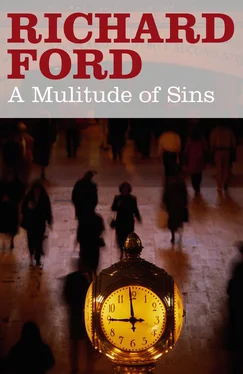In the condo now, Esther has been watching her soaps, but has stopped to play double solitaire and have a glass of wine by the big picture window that looks down toward the crowded ski slope and the ice rink. Roger is actually there on the bunny slope with Jane and Marjorie, though it’s impossible to distinguish them. Red suits. Yellow suits. Lots of dads with kids. All of it soundless.
Faith has had a sauna and is now thinking about phoning Jack, wherever Jack is. Nantucket. New York. London. She has no particular message to leave. Later she plans to do the Nordic Trail under moonlight. Just to be a full participant, to set a good example. For this she has brought LA purchases: loden knickers, a green-and-brown-and-red sweater knitted in the Himalayas, socks from Norway. No way does she plan to get cold.
Esther plays cards at high speed with two decks, her short fat fingers flipping cards and snapping them down as if she hates the game and wants it to be over. Her eyes are intent. She has put on a cream-colored neck brace because the tension of driving has aggravated an old work-related injury. And she is now wearing a big Hawaii-print orange muumuu. How long, Faith wonders, has she been wearing these tents? Twenty years, at least. Since Faith’s own father — Esther’s husband — kicked the bucket.
“Maybe I’ll go to Europe,” Esther says, flicking cards ferociously. “That’d be nice, wouldn’t it?”
Faith is at the window, observing the expert slope. Smooth, wide pastures of snow, framed by copses of beautiful spruces. Several skiers are zigzagging their way down, doing their best to appear stylish. Years ago, she came here with her high-school boyfriend, Eddie, a.k.a. “Fast Eddie,” which in some respects he was. Neither of them liked to ski, nor did they get out of bed to try. Now, skiing reminds her of golf — a golf course made of snow.
“Maybe I’ll take the girls out of school and treat us all to Venice,” Esther goes on. “I’m sure Roger would be relieved.”
Faith has spotted Roger and the girls on the bunny slope. Blue, green and yellow suits, respectively. He is pointing, giving detailed instructions to his daughters about ski etiquette. Just like any dad. She thinks she sees him laughing. It is hard to think of Roger as an average parent.
“They’re too young for Venice,” Faith says, putting her small, good-looking nose near the surprisingly warm windowpane. From outside, she hears the rasp of a snow shovel and muffled voices.
“Maybe I’ll take you to Europe, then,” Esther says. “Maybe when Daisy clears rehab we can all three take in Europe. I always planned for that.”
Faith likes her mother. Her mother is no fool, yet still seeks ways to be generous. But Faith cannot complete a picture that includes herself, her enlarged mother and Daisy on the Champs-Elysées or the Grand Canal. “That’s a nice idea,” she says. She is standing beside her mother’s chair, looking down at the top of her head, hearing her breathe. Her mother’s head is small. Its hair is dark gray and short and sparse, and not especially clean. She has affected a very wide part straight down the middle. Her mother looks like the fat lady in the circus, but wearing a neck brace.
“I was reading what it takes to live to a hundred,” Esther says, neatening the cards on the glass table top in front of her belly. Faith has begun thinking of Jack and what a peculiar species of creep he is. Jack Matthews still wears the Lobb cap-toe shoes he had made for him in college. Ugly, pretentious English shoes. “You have to be physically active,” her mother continues. “And you have to be an optimist, which I am. You have to stay interested in things, which I more or less do. And you have to handle loss well.”
With all her concentration Faith tries not to wonder how she ranks on this scale. “Do you want to be a hundred?”
“Oh, yes,” her mother says. “ You just can’t imagine it, that’s all. You’re too young. And beautiful. And talented.” No irony. Irony is not her mother’s specialty.
Outside, one of the men shoveling snow can be heard to say, “Hi, we’re the Weather Channel.” He’s speaking to someone watching them through another window from yet another condo.
“Colder’n a well-digger’s dick, you bet,” a second man’s voice says. “That’s today’s forecast.”
“Dicks, dicks, and more dicks,” her mother says pleasantly. “That’s it, isn’t it? The male appliance. The whole mystery.”
“So I’m told,” Faith says, and thinks about Fast Eddie.
“They were all women, though,” her mother says.
“Who?”
“All the people who lived to be a hundred. You could do all the other things right. But you still needed to be a woman to survive.”
“Good for us,” Faith says.
“Right. The lucky few.”
This will be the girls’ first Christmas without a tree or their mother. Though Faith has attempted to improvise around this by arranging presents at the base of the large, plastic rubber-tree plant stationed against one of the empty white walls of the small living room. The tree was already here. She has brought with her a few Christmas balls, a gold star and a string of lights that promise to blink. “Christmas in Manila” could be a possible theme.
Outside, the day is growing dim. Faith’s mother is napping. Following his ski lesson, Roger has gone down to The Warming Shed for a mulled wine. The girls are seated on the couch side by side, wearing their Lanz of Salzburg flannel nighties with matching smiling monkey-face slippers. Green and yellow again, but with printed white snowflakes. They have taken their baths together, with Faith to supervise, then insisted on putting on their nighties early for their nap. They seem perfect angels and perfectly wasted on their parents. Faith has decided to pay their college tuitions. Even to Harvard.
“We know how to ski now,” Jane says primly. They’re watching Faith trim the plastic rubber-tree plant. First the blinking lights, though there’s no plug-in close enough, then the six balls (one for each family member). Last will come the gold star. Faith understands she is trying for too much. Though why not try for too much. It’s Christmas. “Marjorie wants to go to the Olympics,” Jane adds.
Jane has watched the Olympics on TV, but Marjorie was too young. It is Jane’s power position. Marjorie looks at her sister without expression, as if no one can observe her staring.
“I’m sure she’ll win a medal,” Faith says, on her knees, fiddling with the fragile strand of tiny peaked bulbs she already knows will not light up. “Would you two like to help me?” She smiles at both of them.
“No,” Jane says.
“No,” Marjorie says immediately after.
“I don’t blame you,” Faith says.
“Is Mommy coming here?” Marjorie blinks, then crosses her tiny, pale ankles. She is sleepy and could possibly cry.
“No, sweet,” Faith says. “This Christmas Mommy is doing herself a favor. So she can’t do one for us.”
“What about Vince?” Jane says authoritatively. Vince is ground that has been gone over several times before now, and carefully. Mrs. Argenbright, the girls’ therapist, has taken special pains with the Vince subject. The girls have the skinny on Mr. Vince but want to be given it again, since they like Vince more than their father.
“Vince is a guest of the state of Ohio, right now,” Faith says. “You remember that? It’s like he’s in college.”
“He’s not in college,” Jane says.
“Does he have a tree where he is,” Marjorie asks.
“Not in any real sense, at least not in his room like you do,” Faith says. “Let’s talk about happier things than our friend Vince, okay?” She is stringing bulbs now, on her knees.
Читать дальше












